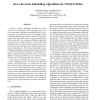Free Online Productivity Tools
i2Speak
i2Symbol
i2OCR
iTex2Img
iWeb2Print
iWeb2Shot
i2Type
iPdf2Split
iPdf2Merge
i2Bopomofo
i2Arabic
i2Style
i2Image
i2PDF
iLatex2Rtf
Sci2ools
ICNP
2003
IEEE
2003
IEEE
Stress Resistant Scheduling Algorithms for CIOQ Switches
Practical crossbar scheduling algorithms for CIOQ switches such as PIM and ¢ -SLIP, can perform poorly under extreme traffic conditions, frequently failing to be workconserving. The common practice of evaluating crossbar scheduling algorithms according to the packet delay under random admissible traffic tends to obscure significant differences that affect the robustness of different algorithms when exposed to extreme conditions. On the other hand, algorithms such as LOOFA with provably good worst-case performance, don’t lend themselves readily to high performance implementation. We advocate evaluating crossbar scheduling algorithms using targeted stress tests which seek to probe the performance boundaries of competing alternatives. Appropriately designed stress tests can reveal key differences among algorithms and can provide the insight needed to spur the development of better solutions. In this paper, we introduce the use of stress testing for crossbar scheduling and use it to...
Crossbar Scheduling Algorithms | ICNP 2003 | Network Protocols | Practical Crossbar Scheduling | Stress Tests |
| Added | 04 Jul 2010 |
| Updated | 04 Jul 2010 |
| Type | Conference |
| Year | 2003 |
| Where | ICNP |
| Authors | Prashanth Pappu, Jonathan S. Turner |
Comments (0)

